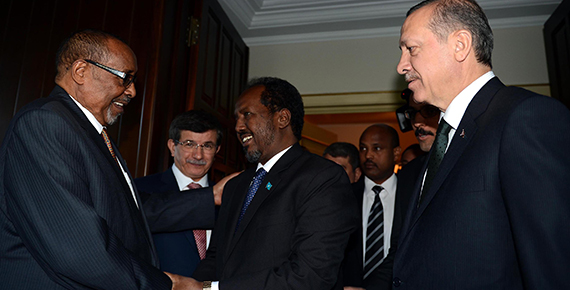Turkey’s Somalia policy has been expanding and deepening over the past two years. On April 13, Turkey brought Somali President Hassan Sheikh Mohamud and Somaliland President Ahmed Silanyo together in Ankara in a sign that it is maintaining a proactive stance in developing serious policies for the Horn of Africa.
As a result of Ankara’s efforts, the two heads of state, who would not even speak to each other under normal circumstances, signed the Ankara Declaration and pledged to avoid using provocative language against each other.
When Prime Minister Recep Tayyip Erdogan went to Somalia in August 2011 with a delegation that packed two planes, the prevalent perception at home and abroad was that the initiative would not go beyond a short-term effort of humanitarian assistance. Western states argued that Ankara would soon understand the complexity of the Somali problem, while in Turkey many people, including the opposition, attempted to use the humanitarian aid issue for domestic political purposes.
But two years on, one could say that Turkey’s Somalia policy has expanded beyond humanitarian aid and is evolving into a policy with political dimensions aimed at restructuring the region.
Another fundamental aspect of Turkish foreign policy that calls for attention is that Somalia has ushered Turkey-Africa relations into a new era. For Turkey, this new era brings the obligation to smartly uses the influence it has garnered in Africa for the resolution of problems that will effectively serve as a principal indicator of Turkey’s actual clout in Africa.
From this perspective, it appears that Somalia will be Turkey’s first test in Africa. That Erdogan has taken the issue of finding a solution for Somalia to the United Nations, the meetings held in Istanbul for the reconstruction of Somalia and, most recently, the signing of the Ankara Declaration demonstrate that Turkey is determined to find a durable and lasting solution for Somalia.
DYNAMİCS OF AFRİCAN GEOPOLİTİCS
Despite all those accomplishments, comprehending regional balances well and drawing up policies accordingly is crucial for Turkey’s success. One of the main reasons for the failure of the UN peace-keeping operation in 1992 was the fact that it ignored historic, political and geopolitical balances in East Africa.
Therefore, a sound analysis of current developments requires a good understanding and reconstruction of the two axes that have historically set the regional balance in East African politics and geopolitics. The main axis of balance has been shaped by Ethiopia and Somalia and the auxiliary axis by Kenya and Sudan.
Turkey initially ignored those balances because its position was based mostly on the rhetoric of humanitarian assistance.
When those balances existed, Djibouti, Burundi, Uganda and the subsequently independent Eritrea acted accordingly, and the basic sharing of water, primarily the Nile, rested on those balances. Egypt, which controls the Lower Nile, felt comfortable and benefited most from the resources of the Nile by playing those balances against each other.
But the civil war and political instability plaguing Somalia since 1991 have tipped the main equilibrium in East Africa in favor of Ethiopia.
Similarly, Sudan, one of the components of the auxiliary balance, has been sidelined amid the Darfur conflict and as a result of its partition, leaving wide maneuvering room for Ethiopia, which proved its supremacy in the conflict with Eritrea.
The most obvious indication of the new situation is Ethiopia’s leadership of its bid for a new Nile Basin Agreement under which it demands a greater share of water for itself and a reduction of Egypt’s share.
Having ignored Africa for years, Egypt has now grasped that the regional balance is changing utterly in favor of Ethiopia, and has directed almost half its diplomatic activities in the post-revolution period to the issue of the Nile and relations with Ethiopia.
<

